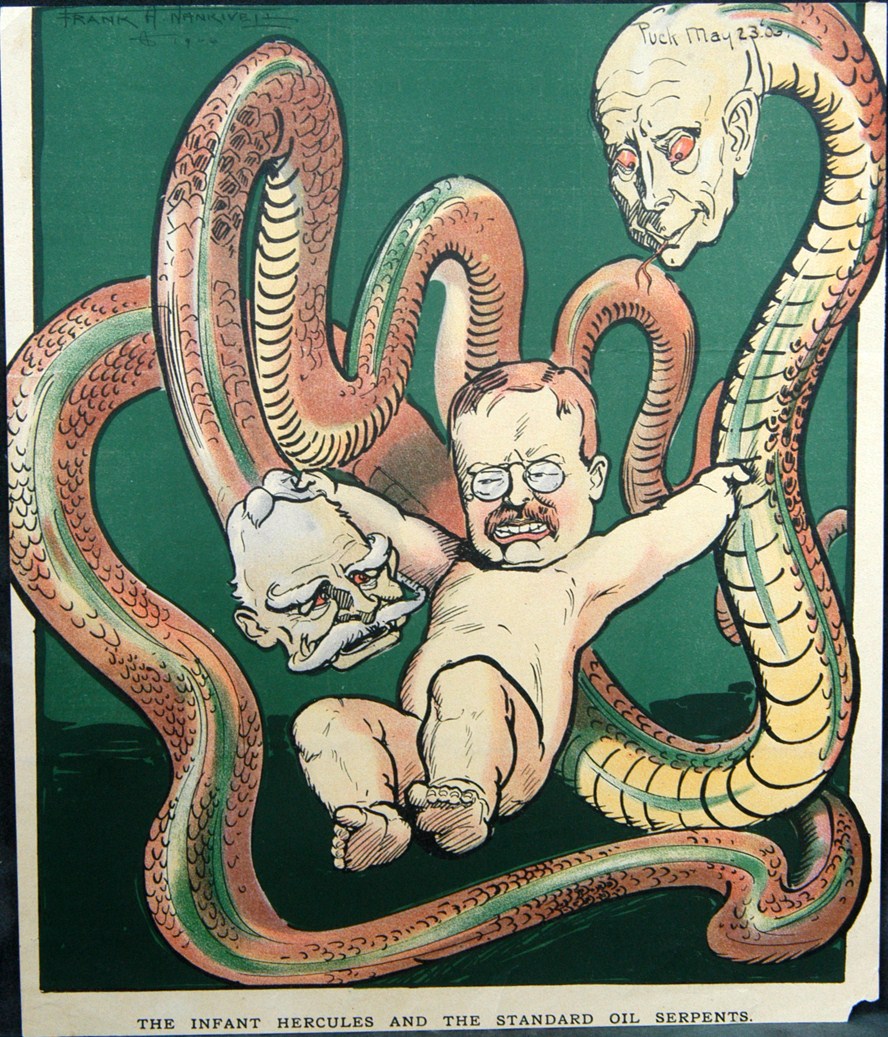As Ronald Reagan so famously put it: “There you go again.”
When he uttered that phrase, Reagan was attacking Jimmy Carter. Today, the observation applies equally to another historical dust-up, between Theodore Roosevelt’s old nemesis — Big Oil and Gas — and the home of TR’s legacy: Theodore Roosevelt National Park (TRNP).
As TR’s great-great-grandson, Winthrop Roosevelt, says in a new video, “Unchecked development [of fracking] is on a collision course with one of America’s truly special places” — the grassland park in North Dakota that bears the name of the America’s greatest environmental president.
A Boom With No Boundaries, produced by the Center for American Progress, shows how a slew of new fracking wells — with many more planned — threatens the integrity of TRNP. The 110-square mile park is home to bison, pronghorn antelope, elk, prairie dogs and other distinctive and rare flora and fauna of the American Badlands.
Roosevelt’s “Ethical Movement” Against Big Oil
There is obvious irony in that the threatened park is named for the nation’s “Wilderness Warrior” (the title of Douglas Brinkley’s compelling TR biography). There’s an added layer of irony. One of TR’s biggest and longest-standing enemies was the Standard Oil Company. When Roosevelt became president in 1901, Standard Oil was Big Oil.

Punch Magazine, 1906.
Even before that, in his last formal address to the New York legislature as that state’s governor, Roosevelt warned that without government regulation and oversight, industrial giants would destroy the environment.
“Unrestrained greed,” Roosevelt said, “means the ruin of the great woods and the drying up of the sources of the rivers.”
TR was at least as concerned about the broader, anti-democratic tendencies of concentrations of great wealth and power. To prevent such abuses, President Roosevelt helped create the Bureau of Corporations, a federal body with unprecedented (but still limited) power to investigate and regulate giant corporations like Standard Oil.
The fight, said Roosevelt, was “fundamentally an ethical movement” targeting “the most dangerous members of the criminal class — the criminals of great wealth.”
Roosevelt had his attorney general sue several companies under the Sherman Anti-Trust Act for price-fixing and other illegal practices. Standard Oil of New Jersey, the umbrella organization for dozens of interconnected companies, was one of Roosevelt’s primary targets.
The foes duked it out in court for years. Although he was no longer president, Roosevelt was vindicated in 1911 when the Supreme Court ordered Standard Oil of New Jersey to spin off some 33 separate companies.
The More Things Change…
…the more they remain the same. Today, Standard Oil’s direct descendent, ExxonMobil, is the world’s largest publicly-held company. The corporation has used its wealth to manipulate public opinion about climate change, and directs millions to political campaigns to support friends and defeat foes.
The “unrestrained greed” that TR warned about a century ago continues to destroy land, both public and private.
On March 30, an ExxonMobil pipeline carrying a particularly corrosive form of tarsand oil called dilbit, ruptured, spilling 80,000 gallons of oil in a Little Rock, Arkansas suburb.
That same week, the media reported on a new study by the National Institute for Occupational Safety and Health, linking sand used in fracking to lung disease in workers.
In a press release accompanying the new CAP video, Andrew Satter and Jessica Goad call on the Obama administration to follow Theodore Roosevelt’s example.
The story of the assault on Theodore Roosevelt National Park is only one example of how energy development and land conservation are out of balance on our public lands. Over the past four years, the Obama administration has leased two-and-a-half times more acres of public lands to oil and gas companies than it has permanently protected. It’s time for the administration to put policies that protect and conserve our public lands and national parks for future generations on equal ground with policies that promote more oil and gas drilling.
